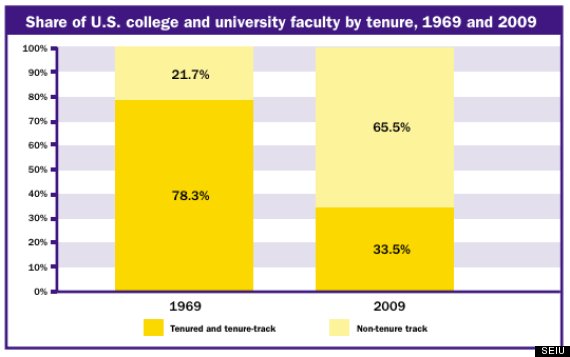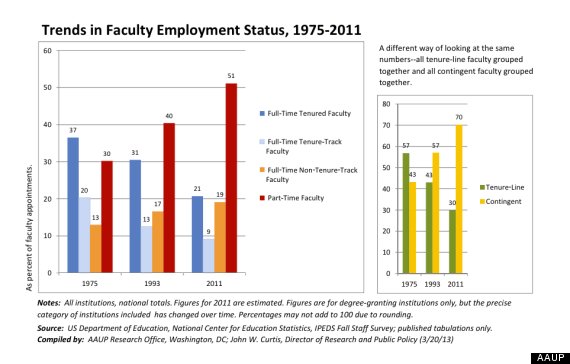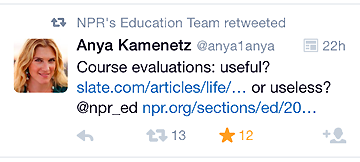The Chronicle of Higher Education article, “The View From the Top, What Presidents Think About Financial Sustainability, Student Outcomes, and the Future of Higher Education”, gives a great snapshot of the perceptions and concerns of 400 public and private college Presidents.
http://cdn2.hubspot.net/hubfs/21820/docs/WhatCollegePresidentsThink.pdf
Among their beliefs:
- Roughly one-half of all college courses will be delivered online by 2019
- 50% of recent graduates are underemployed
- Three-quarters of college leaders believe career prep is the job of the university
- Presidents agree the #1 criteria for school ratings should be completion
An extensive survey of college and university presidents, conducted by The Chronicle of Higher Education in January 2015, EXECUTIVE SUMMARY found that two-thirds of them feel that American higher education is going in the wrong direction, with public college leaders worried about the decline of state financial support and leaders of private institutions most concerned with the intense competition for students.
Traditional colleges, particularly the many that are in the middle of the pack but charge high prices, will lose out to nimbler, cheaper competitors offering degrees on flexible timelines, either in hybrid format (in-person and online) or fully online.
private institutions see new graduate programs as potentially lucrative while public universities view online programs as a source for new cash.
Presidents remain optimistic about the value of a college degree, much more than employers do. A majority of college presidents believe the four- year bachelor’s degree is worth more in today’s job market than it was five years ago (see Figure 9). Meanwhile, surveys of employers by The Chronicle and other organizations in recent years have consistently found those who hire college graduates more neutral on the value of a degree. In a Chronicle survey of employers, for instance, 39 percent said a bachelor’s degree was worth the same as five years ago, and 26 percent said it was worth less.
College leaders and employers often don’t see eye-to-eye on what today’s graduates most need to succeed in the workplace. While companies seek recent college graduates with real-world experience, presidents continue to emphasize the value of academics over experience among their graduates. Indeed, compared to a similar survey of presidents conducted by The Chronicle in 2013, campus executives are even more in favor now of emphasizing academics over real-world experience (see Figure 10).
When it comes to getting students ready for the job market, presidents are not always in agreement with employers and parents on what role the institution should play in the process. A majority of college leaders believe it’s their job to offer experiential learning, such as internships, as part of the curriculum as well as offer career preparation in programs and offices across the campus, both in formal and informal settings. But presidents are more divided about whether colleges should provide a broad education or specific training, and one- third of them don’t want to be held accountable for the career outcomes of their students (see Figure 11).
http://scsu.mn/TechInstruct
+++++++++++++++++++
New Teacher Advice – ‘Hold On To Your Optimism & Idealism’
http://mobile.edweek.org/c.jsp?cid=25920011&item=http%3A%2F%2Fapi.edweek.org%2Fv1%2Fblog%2F100%2F%3Fuuid%3D47397&cmp=soc-edit-tw-tm
Your job is to grow your students to become independent, self-directed learners not for someday in the distant future, but right now. Students deserve to have clarity on the following questions:
- Why do I have to learn this? What value is it to me?
- How will I be assessed?
- How will I be judged?
- How will I be supported during the learning experience?
The Cost of an Adjunct
The plight of non-tenured professors is widely known, but what about the impact they have on the students they’re hired to instruct?
http://www.theatlantic.com/education/archive/2015/05/the-cost-of-an-adjunct/394091
When a college contracts ‘adjunctivitis,’ it’s the students who lose
http://www.pbs.org/newshour/making-sense/when-a-college-contracts-adjunctivitis-its-the-students-who-lose/
Here is an “apologetic” article that adjuncts are not that bad for students and learning:
Are Adjunct Professors Bad for Students?
Some doubts about a recent study suggesting that part-time faculty fail to “connect” with students.
http://www.popecenter.org/commentaries/article.html?id=2045
9 Reasons Why Being An Adjunct Faculty Member Is Terrible
http://www.huffingtonpost.com/2013/11/11/adjunct-faculty_n_4255139.html


The Adjunct Revolt: How Poor Professors Are Fighting Back
http://www.theatlantic.com/business/archive/2014/04/the-adjunct-professor-crisis/361336/
“Students aren’t getting what they pay for or, if they are, it is because adjuncts themselves are subsidizing their education,” Maria Maisto, president of the adjunct activist group New Faculty Majority, told me. “Adjuncts are donating their time; they are providing it out of pocket.”
The adjunct crisis also restricts the research output of American universities. For adjuncts scrambling between multiple short-term, poorly paid teaching jobs, producing scholarship is a luxury they cannot afford. “We have lost an entire generation of scholarship because of this,”
Adjunct Professor Salary
http://www.payscale.com/research/US/Job=Adjunct_Professor/Salary
The New Old Labor Crisis
Think being an adjunct professor is hard? Try being a black adjunct professor.
http://www.slate.com/articles/life/counter_narrative/2014/01/adjunct_crisis_in_higher_ed_an_all_too_familiar_story_for_black_faculty.html
A defense of student evaluations: They’re biased, misleading, and extremely useful.
The answer requires us to think about power. If you look hard at the structure of academia, you will see a lot of teachers who, in one way or another, lack power: adjuncts and term hires (a large population, and growing); untenured faculty (especially in universities like mine); faculty, even tenured faculty, in schools where budget cuts loom; graduate students, always and everywhere. You might see evaluations as instruments by which students, or administrators, exercise power over those vulnerable employees. But if you are a student, and especially if you are a student who cares what grades you get or who needs recommendations, then teachers, for you—even adjuncts and graduate teaching assistants—hold power.
Chairmen and deans also need to know when classroom teaching fails: when a professor makes catastrophically wrong assumptions as to what students already know, for example, or when students find a professor incomprehensible thanks to her thick Scottish accent. My note: indeed, when chairmen and deans KNOW what they are doing and are NOT using evaluations for their own power.
Student Course Evaluations Get An ‘F’ : NPR Ed : NPR
Philip Stark is the chairman of the statistics department at the University of California, Berkeley. “I’ve been teaching at Berkeley since 1988, and the reliance on teaching evaluations has always bothered me,” he says.
Stark is the co-author of “An Evaluation of Course Evaluations,” a new paper that explains some of the reasons why.
Michele Pellizzari, an economics professor at the University of Geneva in Switzerland, has a more serious claim: that course evaluations may in fact measure, and thus motivate, the opposite of good teaching. Here’s what he found. The better the professors were, as measured by their students’ grades in later classes, the lower their ratings from students.
“Show me your stuff,” Stark says. “Syllabi, handouts, exams, video recordings of class, samples of students’ work. Let me know how your students do when they graduate. That seems like a much more holistic appraisal than simply asking students what they think.”
Big Data is Finally Coming to Education Here’s What We’ve Learned So Far
http://www.edukwest.com/big-data-education/
Long lectures don’t work.
The best predictor of future course behavior is past course behavior.
Data from MOOCs suggest that one way to boost completion rates is to increase engagement early in the course.
Even in online courses, offline support is essential.
More IMS blog entries on Big Data:
https://blog.stcloudstate.edu/ims/?s=big+data
Pls have a link to the PDF file
edutopia-dl-finley-53-ways-to-check-understanding
Here some opinions from the comments section:
Formative assessments are only good if you use them to alter your teaching or for students to adjust their learning. Too often, I’ve seen exit tickets used and nothing is done with the results.
Please consider other IMS blog postings on assessment
https://blog.stcloudstate.edu/ims/?s=assessment
No Child Left Behind and other programs that emphasized standardized tests increased this problem, according to Maggiano. The more the school system relies on standardized testing, he says, the more difficult it is for teachers to foster critical thinking and other useful skills.
Award-winning Virginia teacher: ‘I can no longer cooperate’ with testing regime
http://www.washingtonpost.com/blogs/answer-sheet/wp/2013/05/26/award-winning-virginia-teacher-i-can-no-longer-cooperate-with-testing-regime/


